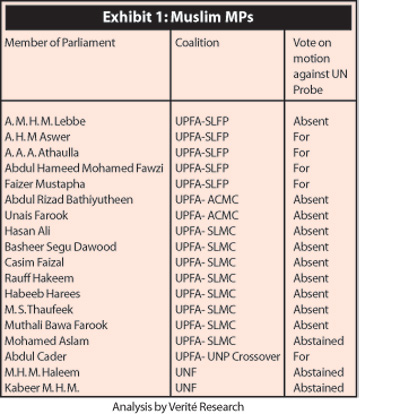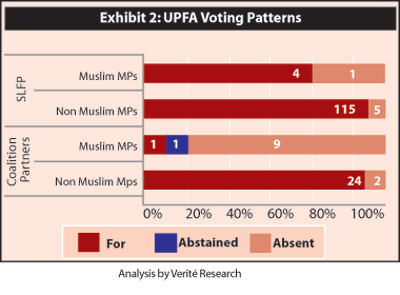News
Did Muslim MPs dissent in Parliament after Aluthgama?
View(s):There are three ways of dissenting with a government sponsored vote in parliament, when a division is called (that is each MP’s vote is individually recorded). These three ways can be ranked in terms of the strength of dissent. The strongest is to vote against; next is to stay in the house and abstain. The weakest form is to be purposively absent from the house.
![]() On 18 June, the parliament voted on a motion that “the investigation to be conducted against Sri Lanka by the Office of the United Nations High Commissioner for Human Rights should not be carried out…” The vote took place three days after mob based violence in Aluthgama (spreading to Beruwela), with the Muslim people in these areas being the main victims. Muslim MPs expressed shame and anger with the government for what happened. Given this backdrop, how did the Muslim MPs vote?
On 18 June, the parliament voted on a motion that “the investigation to be conducted against Sri Lanka by the Office of the United Nations High Commissioner for Human Rights should not be carried out…” The vote took place three days after mob based violence in Aluthgama (spreading to Beruwela), with the Muslim people in these areas being the main victims. Muslim MPs expressed shame and anger with the government for what happened. Given this backdrop, how did the Muslim MPs vote?
 Muslim MPs in Parliament There are 18 Muslim MPs in parliament. Sixteen of them are part of the UPFA; out of which eight are from the SLMC, two from the ACMC, five from the SLFP and one is a UNP-crossover. The remaining two belong to the UNF.
Muslim MPs in Parliament There are 18 Muslim MPs in parliament. Sixteen of them are part of the UPFA; out of which eight are from the SLMC, two from the ACMC, five from the SLFP and one is a UNP-crossover. The remaining two belong to the UNF.
The team at Manthri.lk, a pioneering online platform that monitors and ranks all the proceedings and actors in parliament, analysed the Muslim MPs’ voting on the motion as recorded in the parliamentary Hansard (link below). Five of the Muslim MPs voted in favour of the motion while the others did not vote by being absent or by abstaining (Graphic 1). None voted against.
 Did Muslim MPs Dissent?
Did Muslim MPs Dissent?
UNP-Crossover: Abdul Cader who has crossed over to the government voted for the motion. SLFP: Four of the five SLFP Muslim MPs also did not dissent – they voted for the motion; the last one registered the weakest form of dissent by being absent. SLMC: Most of the SLMC also registered only the weakest form of parliamentary dissent by being absent for the vote in parliament and letting it be known that it was in protest of the violence suffered in Aluthgama and Beruwela. But one SLMC MP, Mohamed Aslam, took the expression of dissent a step further by staying in parliament and abstaining from the vote.
ACMC: The two MPs from the ACMC followed most of the SLMC in absenting themselves. UNP: The two Muslim MPs from the UNP took the stronger form of dissent by staying in the house and abstaining.Not a single Muslim MP expressed the strongest form of dissent of staying in the house and voting against the motion. In Parliament, it was only the TNA that expressed this form of dissent.
Overall Muslim Dissent: Overall, however it is clear that the level of dissent on the motion, even if mostly in the weakest form, is much higher amongst Muslim MPs than non Muslim MPs. From the SLFP 20% of the Muslim MPs dissented, as against 4% of the non-Muslim MPs. From the governing coalition partners, 82% of the Muslim MPs dissented, as against less than 8% of the non-Muslim MPs (graphic 2).
Are you surprised with the voting patterns? Did the government lose the support of the Muslim MPs or not? SMS your comments to 071-463-9882 or leave a comment on facebook.com/Manthrilk.

